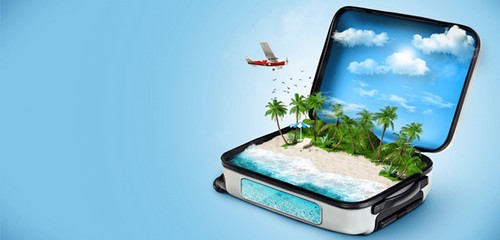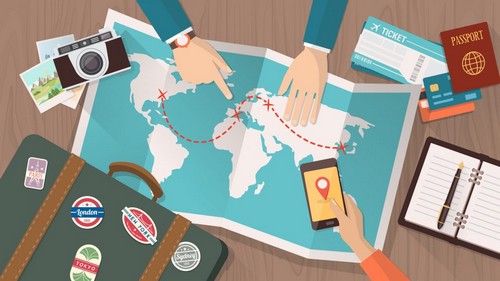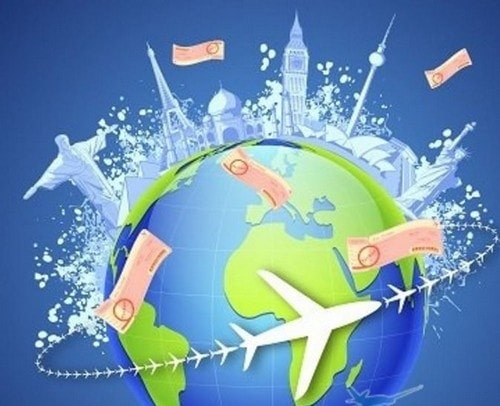From hotels and other types of accommodation to car rental services, airlines, restaurants, entertainment spots, and travel agents – tourism marketing encompasses a wide range of advertising and marketing strategies often used by companies in the tourism and travel industry themselves. All these various marketing efforts are put together under one collective name – Tourism Marketing!
Tourism marketing is an essential tool for a business to ensure they are standing apart from its competitors, garnering customers, and creating brand recognition. Nowadays, various digital marketing platforms such as websites, online ads, email marketing campaigns, and social media marketing outlets have become vital components of modern tourism marketing initiatives for businesses.
Table of Contents
What is Tourism Marketing?
Tourism marketing is a type of marketing used by businesses operating in the travel and tourism industry to attract tourists to a business name or particular location which can be a state, a city, a particular heritage site or tourist destination spot, a hotel, or a convention center anything.
Achieving success in the travel and tourism industry requires thoughtful Tourism Marketing campaigns that are designed to generate brand awareness, create both, reach the most target audience or potential customers, drive traffic, foster loyalty among existing clients, and create a captivating customer experience. By utilizing these strategies, businesses can effectively engage with travelers while generating more sales opportunities.
Tourism Marketing has been profoundly impacted in recent years by digital development, as well as changes in consumer attitudes and desires. Crafting successful Tourism marketing messages today entails taking advantage of social media platforms, featuring user generated content, leveraging online reviews and search engines to your benefit, collaborating with influencers to drive traffic and expand reach, and experimenting with various channels for targeted messaging to attract travelers and optimize their customer journey in a way to convert them into loyal customers.
Why is Tourism Marketing Important?
To make a tourism business thrive, savvy marketing is an absolute must. By staying up-to-date with current trends and launching impactful campaigns, businesses can boost the recognition of their brand, gain customer loyalty and attract travellers. Moreover, tourism marketing holds promise for contributing to the economic growth of the region by driving tourists towards local enterprises.
The tourism industry is one of the biggest in the world and therefore highly competitive. To succeed, businesses must differentiate themselves from their competitors by promoting and advertising what makes them unique, showcasing why they’re the best option for tourists, and advertising and highlighting any special features that set them apart.
To allow businesses to gain a competitive advantage, marketing is essential. Many of the top tourism marketing approaches concentrate on highlighting a business’ unique selling point and broadcasting it effectively. Moreover, marketers must keep abreast with current trends to generate an effective promotional mix and deploy the most viable methods for disseminating their message across all channels.
Understanding the concept of Tourism Marketing
Tourism marketing is associated with most businesses, with marketing strategies in the field of tourism. Today there are many countries in the world, where the tourism industry plays a major role in economic development, enhancing their GDP.
In such cases, tourism and digital marketing become important things. Many of the places are generally the hotspot for tourists like the Taj Mahal in India. Now places like these are considered the perfect areas where one can boost tourism through digital marketing.
The places which are more likely to be the major spots for attracting tourists are the places where tourism marketing flourishes the most. Now tourism marketing is all about applying several marketing techniques and strategies to create and boost the tourism industry of that place.
For successful tourism marketing to take place, the thing that is required the most is that the brands should speak for themselves in such a way that makes sense that their voices can be heard in the targeted markets. This way they will be able to generate the cleanest successfully. Also, they need to be really careful in providing services to clients.
This is because if the customers are happy with the services chances they will spread the word and this may bring them more customers. In the case of tourism marketing, it becomes easy to find the right audiences and create content to draw the attention of the targeted customers to the website by providing encouraging content. Thus strategic planning, content marketing, and branding is the key to effective tourism marketing.
With it being carried out by keeping these two points in mind, chances are that the company that is involved in tourism marketing will be able to gain the advantage over their existing customers in no time and become a monopoly in the tourism industry.
What are the different ways in which Tourism Marketing Can Be Done in 2023?
Now various methods are applied for tourism marketing to flourish. Below are some of the important ways in which the tourism marking of any place is given a boost.
1) Location marketing
In this type of marketing strategy, the main focus of tourism marketing is one bringing people’s attention to a specific location. In this strategy, no recommendations are made with respect to a particular site or any accommodation. Now some locations are already so popular all over the world that tourism marketers don’t have to make many efforts to attract their attention to such places.
All they need to do to attract customers is remind them of such locations and chances are that the consumer can easily get convinced to spend money and visit any such place. For example, Las Vegas is popular for its undying charm and full of life kind of prospects.
Now there s also a popular slogan related to Las Vegas which is ‘What happens in Vegas, stays in Vegas’. This slogan has gained worldwide popularity and almost everyone wants to visit Las Vegas at least once.
So here the tourism marketers have to simply remind people of how amazing this city is and what are the different ways in which they can have the time of their lives here. Another example that can be taken in Florida.
They use a more ‘benefit-oriented’ approach. Their slogan and website are ‘The Sunshine State’. This way they are presenting their state with a joyous and charming climate and as a perfect place for beach and football lovers. Also with their slogan and website, they are successfully able to present their state as an ideal ‘summer vacation’ destination and are definitely a dream for many to visit this place.
Thus location marketing is one of the simplest forms of tourism marketing in which without even putting much effort, with the brand value and the popularity of some specific location, the customers can be attracted.
2) Activity marketing
Now, this type of tourism is carried out keeping in mind both the location and the activities that are performed in such places. This type of tourism marketing strategy usually keeps in mind travelers who are adventure lovers or activity freaks.
There are many other sites and locations all over the world that are famous for some specific activities. Like Alaska is famous for snowboarding, Yellowstone national park is famous for thrilling activities like hiking, and camping and is a perfect place for all nature lovers, similarly, there is ‘Colonial Williamsburg’ which attracts all history lovers.
Thus depending on the target audience and the type of activity that a particular place is famous for, tourism marketing can be carried out. Some people may be adventure lovers, some people may be looking for art and culture some people love hunting, depending upon their area of expertise and interest, the tourism markers can segment the groups of potential visitors and customers and approach them.
Thus activity marketing is a form of tourism making and social media marketing that emphasizes the booking process and bringing the attention of a customer to particular places on the basis of the activities that are performed there.
3) Corporate marketing
This is quite an interesting approach to tourism marketing. Now it has been found that a large number of people working in corporate sectors have to travel to different places to attend a conference or a meeting.
Then according to research, it was found these locations were ideal for tourists, and a number of people came to attend those places. Also, they brought their families and their loved ones as well. Now considering these scenarios’ latest trends in mind, corporate influencer marketing can contribute a lot to tourism marketing as it has significant potential.
Here the tourism marketers take advantage of the fact that by planning the business meeting in touristy places, people come in large numbers thus they can make a lot of profit out of it.
What are the four basic pillars of Tourism Marketing?
The foundation of tourism marketing stands firmly on four of its important pillars which are the product, the price, the place, email marketing, and the promotion.
Let us understand each of these separately as to how they contribute to tourism marketing!
Marketing Mix of Tourism
1) Product in Tourism Marketing
One of the most important aspects of the tourism marketing strategy is to determine the effect of the selling benefits and the other types of benefits that are re-obtained by competing with their rivals in the same market.
Tourism marketers need to focus more on such destinations that provide both business advantages to travel brands and pleasure to their customers. These pleasures depend on several factors like the ease of traveling, facilities of the sites and the hotels, the nightlife of that place, activities offered, and the overall culture of that place.
Thus by considering these factors, tourism marketers will understand the areas that have to focus more on, so that marketing can be done effectively.
2) Price in Tourism Marketing
The price point is yet another important aspect of tourism marketing. Now many people avoid traveling due to money-related issues. And this is where tourism marketing comes in to save the day. Today so many mobile apps have been developed, on which if a person books a hotel r a transport like a flight or a train, they get discounts. This attracts a lot of customers.
Along with the free referral marketing, they also try to give value-added services to their customers. Some hotels also offer free shuttle services to their visitors. Also depending on whether it is a high season or an offseason, the prices are altered.
3) Place in Tourism Marketing
Now for tourism marketing to earn a profit, deciding the location where they want to perform the marketing can play a key role in how far they can go. The place refers to the area where the products and services can be distributed.
Now in tourism and destination marketing, the location and the destination marketers offer their products and services to their customers through travel agents, tour operators, inside sales teas, etc. The distribution of their products and services to visitors can be done through catalogs, online, sites, mobile devices, websites, stores, etc.
4) Promotion
In this numerous different strategies and technologies are used for the promotion of any specific area or tourist destination. In fact, trade magazines and meeting planners are also efficient ways for promotion purposes.
These often come with many other forms of discount coupons, brochures, etc. also they try their target customers to come across the ads that pop up on the website to make them aware of the various tourist places.
15 Tourism Marketing Strategies in 2023
1. Prioritising Hygiene and Safety Via Marketing Communication
Tourism marketers must now prioritize safety and hygiene to give their customers peace of mind when they travel. By highlighting the protocols that are being taken, tourists can rest assured knowing they will be protected while visiting.
2. Developing Loyalty Programmes
Loyalty programs are the ideal way to demonstrate your appreciation for existing customers and stimulate repeated patronage. Tourism marketers should construct loyalty programs that will not only retain existing customers but also appeal to fresh audiences.
3. Capitalising on Voice Search
In the age of voice search, it is essential for tourism marketers to create content that can be quickly found and accessed. Optimizing your site and content for this new technology will bolster your site for visibility and success in the long term.
4. Facilitating User-Generated Content
User-generated content, such as ratings and reviews on social media, is critical in helping customers make informed decisions. User-generated social media content is one of the key tourism marketing trends.
5. Deploying Artificial Intelligence:
AI technology is a valuable asset for Tourism marketers, allowing them to track customer behavior and create personalized brand experiences tailored to each individual. This can help customers find the brand information they need quicker and more easily than ever before.
6. Not Neglect Review Marketing
Reviews and ratings are a critical resource for Tourism companies, making them an invaluable asset in swaying potential customer decisions. Any Tourism marketer must recognize the importance of reviews if they wish to stay competitive.
7. Enhancing the Guest Experience & Satisfaction Through Chatbots
Chatbots can be a vital tool in creating an effortless, tailored experience for all customers. Chatbot technology should be a top priority for the hospitality and tourism industry to provide quick customer service and support, as well as respond promptly to any inquiries.
8. Investing in Remarketing Efforts
Maximizing your Tourism business’ potential by tapping into already engaged customers is a surefire way of increasing sales. Leverage the power of remarketing to maximize your potential and gain more qualified leads.
9. Utilising Augmented Reality Technology
Augmented reality provides the ideal platform for tourism businesses to build mesmerizing and unforgettable experiences for their customers.
10. Prioritising Personalisation
Customization is a crucial element of this form of marketing. By personalizing content and messages to the target audience’s wants and needs, Tourism marketers can engineer and create an experience that will ensure positive word-of-mouth publicity for their business or brand.
11. Exploring Metaverse
The metaverse is becoming more and more popular with tourism companies, as it allows them to give their customers an unparalleled, immersive experience.
12. Using NFTs
Non-fungible tokens, or NFTs, are quickly becoming a widely recognized trend. Tourism companies can harness this technology to propel their marketing campaigns and draw in more visitors.
13. Promoting Virtual Reality (VR) Tours
Allow your customers to explore new destinations without even having to leave their homes – with VR tours, the possibilities are endless!
14. Focusing on the Customer Experience
Crafting an exceptional customer experience should be the primary focus of any Tourism promotional strategy. Optimizing customer experiences on all marketing channels is crucial.
15. Embracing content and influencer marketing
Content and influencer marketing are essential building blocks of any successful tourism strategy. It helps in optimizing the presence of a travel business in the search engine.
Conclusion
Thus, tourism and travel agency marketing are one of the branches of marketing that deal with the tourism and travel industry only.
It is essential to carry out efficient tourism marketing, as one can make a lot of money through this because there are so many people in this world who love traveling, and this can help the tourism marketing industry to flourish their business.
How can companies effectively harness the power of tourism marketing today?
According to a 2023 report by Statista, global digital travel sales are projected to reach approximately $817 billion, indicating the extensive role that digital platforms play in today’s tourism industry. Businesses can leverage this growth by investing in mobile-friendly websites and personalized digital marketing strategies to capture this burgeoning market. Emphasizing user-generated content and reviews can further enhance their visibility and credibility, as 93% of travelers say that online reviews influence their booking decisions (TripAdvisor, 2023).
For those looking to innovate in tourism marketing, experimenting with emerging technologies like augmented reality (AR) and virtual reality (VR) can create immersive experiences that captivate potential tourists. According to Deloitte’s 2023 Travel and Hospitality Outlook, travel companies that employed AR and VR in their marketing campaigns saw a 15% increase in customer engagement rates. These tools not only make marketing efforts more interactive and engaging but also provide a virtual gateway for potential customers to explore their travel options, thereby enhancing decision-making processes.
Liked this post? Check out the complete series on Marketing




This was a great article! Now I’m interested in a career in tourism marketing. How do I start? I already write travel content/copywriting blogs for an agency. Where would I go from there?
this article really helped me in conducting research on tourism. Thank you very much
Nice ?
This article helped me alot on my academic research
Hello,the article is highly assisting and I am seriously having interest in studying Tourism Marketing.
This information was very helpful
hey!
This is a good and interesting article about tourism marketing.
I am a second degree student in tourism business administration,the program is all about tourism as a business perspective.if you can possible,please post such relevant articles via email address that i have attached below the space provided.
thank you!